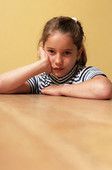School Program Offers Some Help to Violence-Affected Kids
After a school-based psychosocial intervention, children exposed to armed conflict had improvements in post-traumatic stress symptoms, but showed no significant changes in several other outcomes, according to research published Aug. 13 in the Journal of the American Medical Association.

TUESDAY, Aug. 12 (HealthDay News) -- After a school-based psychosocial intervention, children exposed to armed conflict had improvements in post-traumatic stress symptoms, but showed no significant changes in several other outcomes, according to research published Aug. 13 in the Journal of the American Medical Association.
Wietse A. Tol, of HealthNet TPO in Amsterdam, the Netherlands, and colleagues analyzed data from 495 children, mean age 9.9, in schools in Poso, Indonesia, a region long affected by political violence. Children were randomized to either 15 group sessions focused on processing trauma, creative expression and other activities, or to a wait-listed control group. Interventions were led by specially trained local adults with some experience in volunteering in humanitarian programs.
The treatment group was associated with more improvement in post-traumatic stress disorder symptoms and maintained hope, the researchers report. Changes between the groups for outcomes including stress-related physical symptoms, depressive symptoms or anxiety were not significantly different, however, the report indicates.
"In conclusion, we found treatment effects on three out of the six child-rated outcome instruments for girls and one out of six for boys. We hypothesize that these results may show that psychosocial interventions alone are unable to reverse the challenges to psychosocial well-being presented by chronic poverty and political instability. Further integration of psychosocial interventions with poverty reduction and conflict resolution might be indicated," the authors conclude.
Copyright © 2008 ScoutNews, LLC. All rights reserved.